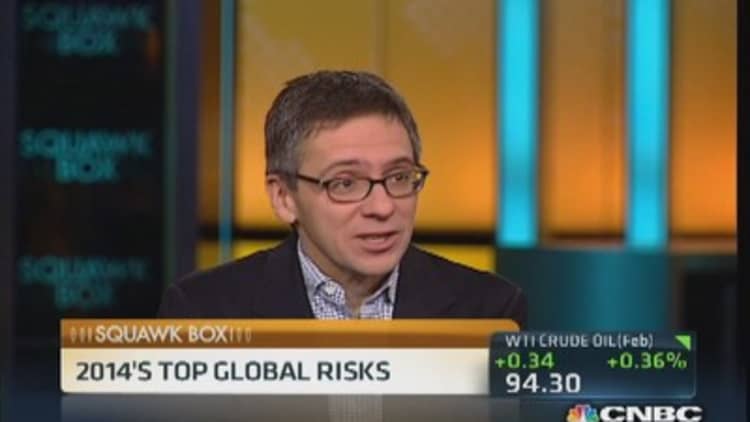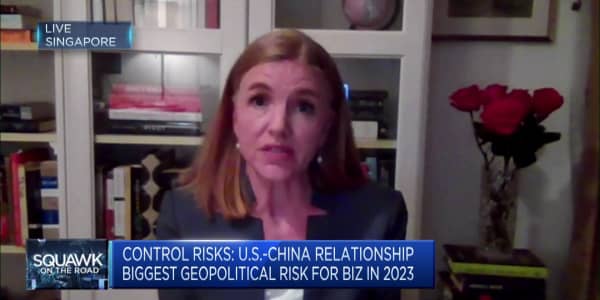
Oil prices could go well under $80 a barrel if a deal is struck to rein in Iran's nuclear ambitions, Eurasia Group President Ian Bremmer predicted Monday.
"This is the do or die year for Iran," he said on CNBC's "Squawk Box."
The price of oil, as he pointed out, is already going down as an extra 500,000 barrels a day of Libyan supply are coming back online after the restart of a key oilfield there.
Last week, oil prices dropped 6.3 percent—its worst week since June 2012. Crude is slightly higher in early Monday trading.
(Read more: Brent tops $107 in rebound; gains limited by Libyan supply)
"Even without an Iranian deal, the Saudis are going to have to reduce production just to maintain a price floor above $80 [a barrel] by the end of first quarter," Bremmer said.
"If an Iran deal happens, we're going well under that. The Saudis won't be able to keep that going," he added.
Alternatively, he pointed to a grim scenario if an Iran deal isn't achieved: "Iran moving very quickly towards becoming a de facto nuclear breakout state, the Saudis going nuclear, too."
Bremmer's comments follow Eurasia's report on their top risks facing the world in 2014—risks that are likely to stem from politics rather than the economic environment, which has stabilized since the 2008 financial crisis.
In a report released Monday, the political risk consultancy ranked America's troubled alliances, diverging markets, China, Iran and petrostates as the top five in a list of 10 risks facing the world.
(Read more: Ten trends that will shape Asia in 2014: Carnegie)
"In 2014, big-picture economics are stable if not yet comforting," Eurasia said in the report. "But geopolitics is very much in play. The realities of a G-Zero order, a world of geopolitical creative destruction without global leadership, are evident."
Political risk has resurfaced recently, from tension between Asia's two big economies—China and Japan—over disputed islands in the East China Sea, to unrest in Ukraine, Turkey, Egypt, Thailand and Cambodia.
"There are tensions between China and Japan in the East China Sea, elite-level executions in North Korea, Russia flexing its muscles in neighboring Ukraine and beyond, and everyone fighting with everyone else in the Middle East," Eurasia said. "All of which is changing the geopolitical map quite aside from the role of the world's only superpower."
Geopolitical risk in Asia has increasingly been talked about by analysts as something to watch closely this year.
"The biggest risk arguably is in north Asia, with the conflicts between Japan and China that needs to be resolved," Colin Chapman, president, New South Wales at the Australian Institute of International Affairs, told CNBC on Monday.
Eurasia said that other risks this year include cybersecurity, a resurgence of al-Qaeda-style terrorism, growing unrest in the Middle East, and Russia, where the popularity of President Vladimir Putin is slipping, and instability in Turkey.
(Read more: Geopolitical risk: Iran is out, China and Japan are in)

US: A troubled power abroad?
While the U.S. now enjoys one of the "most exciting" economic growth stories in the world, there has been a "notable decline" in the country's foreign policy, Eurasia said.
It put this down to a distracted Europe led by Germany instead of a more geopolitically aligned France and Germany, while Russia and China appear more willing to challenge U.S. preferences overseas and U.S. voters offer less support for an ambitious foreign policy.
(Read more: Jack Lew to press Germany on domestic demand)
"Add in a handful of significant missteps—regarding Syria, the response to the NSA/Snowden affair, and the need for domestic focus on congressional infighting and the Obamacare rollout fiasco—and you have the makings of a perfect U.S. foreign policy storm," Eurasia said.
It added that the implications were a more challenging outlook for U.S. corporates and less effective multilateralism that could weaken trade partnerships such as the Trans Pacific Partnership. Confusion about U.S. commitments meanwhile could "complicate" choices for those states balancing political and economic interests between the U.S. and China, especially in Asia.
Election year
Political risk is high on the agenda with a number of key emerging markets facing an election year. These include Brazil, Colombia, South Africa, Turkey, India and Indonesia.
(Read more: Four major emerging nations face crucial elections)
"Not one of those countries enters its electoral cycle with strong, popular leadership. Then add empowered middle classes that demand greater accountability from their governments. The stakes are rising, and some of the world's key economies are in for a rough ride," Eurasia said.
It expects major emerging markets to diverge significantly after elections, with a positive outlook on Columbia and was skeptical on India.
Eurasia said that reform efforts by China's new leadership mean there is now "much more uncertainty" within the world's second largest economy.
Beijing unveiled a host of sweeping long-term reforms in November such as easing the controversial one-child policy, relaxing the system of household registration and granting greater rights to farmers.
(Read more: China's economic reforms: What you need to know)
"Reforms might prove to be very successful, improving China's investment climate and opportunities for integration into the world economy," Eurasia said. "Still, the government is loosening its hold on key reins of the domestic economy on an historic scale, and that could have serious unforeseen consequences."
—By CNBC's Dhara Ranasinghe. Follow her on Twitter @DharaCNBC. CNBC's Matthew J. Belvedere contributed to this article. Follow him on Twitter @Matt_SquawkCNBC.






